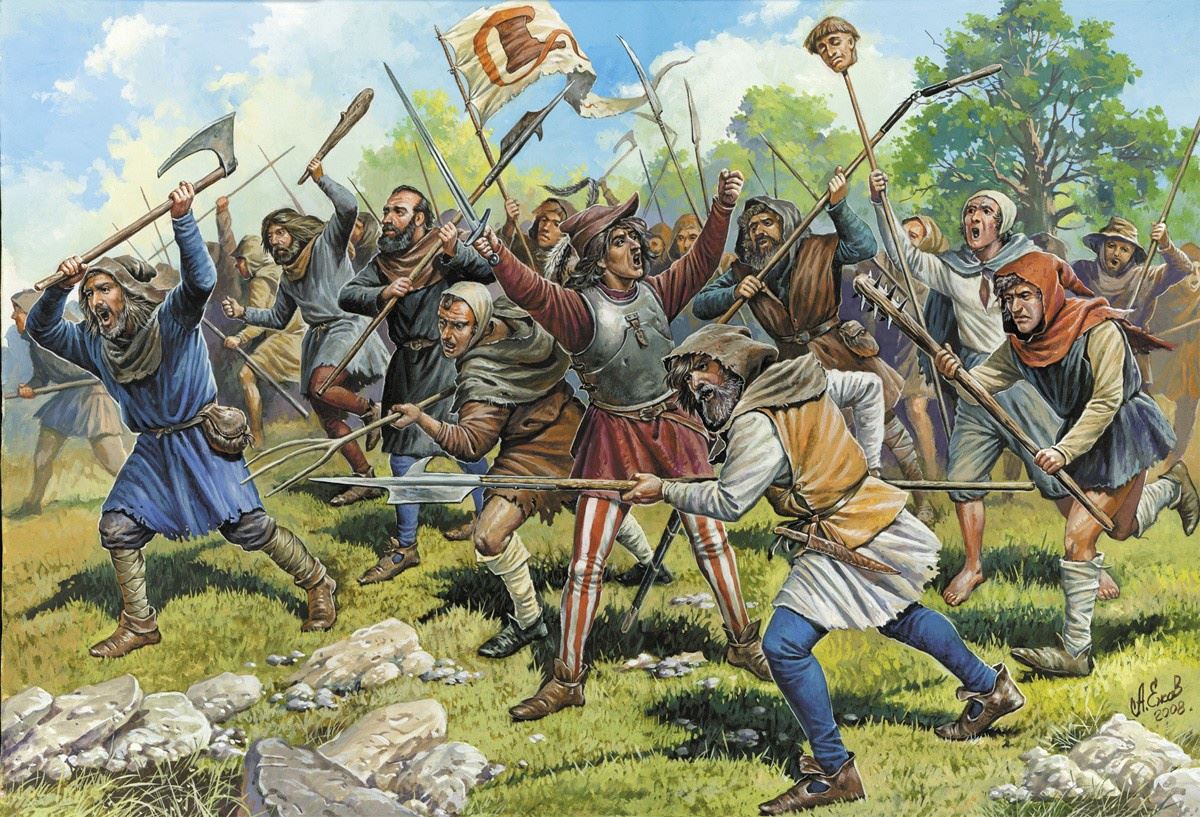Zvesda Medieval Peasants RR
Couldn't load pickup availability
They had been refused in justice, moreover courts were venal. Further, if a knight could not receive money from a peasant by some way then he can throw him into prison without ceremony and force to pay ransom. Of course, people's patience was not endless, that is why armed revolts against oppression were rather often during all history of the Europe. Badly armed, without any armours and regular military training peasant armies nevertheless were able to withstand against skilled professional groups of knights and burgesses.
Substantially, it was supported by the spiritual character of many protests. Ideological leaders of peasantry (Thomas Muntzer, Wat Tyler, Hans Boheim), while demanding abolition of obligations had been proven it by originally equal rights of people in the face of God. Unfortunately, absence of long traditions of collective unity, incapacity for establishing of administrative work had been caused soon or lately to discords between rebels, and ruling clique was always able to take profit by that. Suppressions of revolts were always cruel and bloody. None of popular uprisings before French Revolution can be considered as successful.
-
Brand
-
Part Number
-
EAN
Delivery
All items available for purchase are displayed with estimated despatch times, these dates are based on the product stock status and processing time.
We use two main status's we use on items,
IN STOCK - These items will ship same day if ordered before 2.30pm
AVAILABLE TO ORDER - These items aren't available for same day despatch and will take a day or two to be despatched.
If your order contains both IN STOCK and AVAILABLE TO ORDER items, the entire order will ship as one once all items are available.
Courier options are displayed at the checkout and will effect delivery times once your order is despatched.
We offer free delivery to most Mainland UK addresses on orders over £125. Deliveries to any off-shore islands, international addresses and certain parts of Scotland/Highlands may incur delivery surcharges. These charges will depend on your postcode and the product(s) you are purchasing, examples shown below. Please contact us to clarify costs prior to purchasing if you are unsure. If you place an order and a delivery surcharge is required, a member of our team will be in contact by e-mail or phone.
- Eire
- Highlands of Scotland
- Isle of Wight
- Isle of Man
- Northern Ireland
- Scottish Islands & Channel Islands
- Republic of Ireland
- EU Countries
In addition to a surcharge, deliveries to the above destinations may take an extra day or two for completion.
Collections
If you choose to collect your order, please note the stock status as this will determine if your order will be able to be collected immediately or may be ready in a day or two. We will contact you via email when your order is ready to be collect. Please wait until you have been informed your order is ready to collect before visiting us to avoid disappointment.
Returns
If for any reason you are dissatisfied with your purchase, we offer a 30 day money back guarantee on all our items that are UNUSED and in their original packaging. Should you receive an item from us that you believe to be faulty, please contact us first to allow us to confirm / diagnose the fault and in many cases we can provide an immediate solution.
All refunds are at our discretion and will only be issued once we have received the returned item(s) and are satisfied that they are in unused condition. We advise that all returned items should to be sent recorded / signed for and insured to the correct product value as Make It Build It cannot be held responsible for returned items that are lost or damaged in transit. Please be aware that any refunds will not include your return postage cost.
If you wish to return any item(s) please contact us first at enquiries@makeitbuildit.co.uk. When shipping your item, please ensure your order number is displayed on the return packaging and included with the item inside the returned packaging. This will ensure that your return is dealt with in a prompt manner.
For more information on our returns policy please see our Terms & Conditions | Make It Build it



